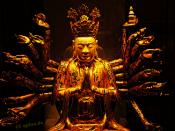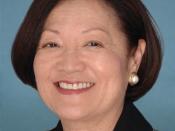Buddhism has emerged as an alternative religion that is poised to be a cultural, spiritual, and political force. Lewis (2008) stated, ÃÂAs for being a political force, there are still too few Buddhists in America to stop the flood of fundamentalism and the myopic national and state policies. However, there was a Shin Buddhist Congressman, Mr. Bob Matsui from Sacramento who died in 2005. In 2007, the 110th U.S. Congress acquired two new Buddhist Representatives, Mazie Hirono of Hawaii and Hank Johnson of GeorgiaÃÂ(para.11). Moreover, many well-regarded organizations such as the Buddhist Peace Fellowship have engaged in death penalty reform.
Religion plays a pivotal part in election year politics. Democrat and Republican candidates try to take the mantle of religion to legitimize themselves to Christian conservatives. Both parties make a grab for the fundamental and ever-increasing pluralized Christian votes with less significant constituencies such as Buddhists left out of the dispute.
According to Richard Hays (1997), it is no accident, to suppose, that less than 5% of all non-Asian Buddhists in the United States are registered Republicans. It is not because there is anything intrinsic to Buddhist doctrines as such that would oppose liberal or even ultra-liberal (or, as Americans call them, conservative and ultra-conservative) political values. After all, Buddhists and Republicans both tend to oppose any but the most minimalist government. Moreover, both love elephants (para. 2). Historically speaking, Buddhism has tended to maintain conservative status quo regimes in Asia, going all the way back to India.
Richard Hays (1997) stated, ÃÂthe reason for European and Afro-American Buddhist disinclination to support the Republican Party is that in the United States the Republican Party has linked itself with patriotism, conservative Christian (and especially Protestant) moral values, and the interests of corporate business. People who favor such "mainstream" American values are not the ones who tend to drop out in various ways (such as by becoming marginalized academics who teach arcane subjects such as Sanskrit grammar and medieval Indian philosophy)ÃÂ. Richard Hayes (1997) further stated, ÃÂthat non-Asian Buddhist converts in the United States tend to be unusually highly educated people, academics, homosexuals, political radicals, former drug users, performing artists and other people who have very little real influence or political or economic power (and very little interest in having real power)ÃÂ (para. 3). Republicans blame these same individuals for most of society ills.
One blogger stated, ÃÂIt is certain Christian Americans who force divisive issues, such as school pledges to God or gay marriage bans, into the political debates. All Americans have to deal with the consequences. It is interesting, therefore, to observe how American Buddhist organizations publicly react to such issuesÃÂ (Tricycleblog, 2004). In 1954, the pledge of allegiance as a non-religious oath was theocized and declared unconstitutional in 2002. The Buddhist have been absent on support for the current pledge. In fact, 23 Buddhist supported an amicus brief that supported the 2002 unconstitutionality of the pledge of allegiance (Tricycleblog, 2004). Buddhism does not establish oaths to God because that would be anti-Buddhist.
As for gay marriage, Buddhist have been quieter on this subject. Homosexuality is not to be sanctioned or condemned according to Buddhism because the issue is not clear in their beliefs. Nevertheless the MinisterÃÂs Association of the Buddhist Churches of America made the following statement: "Whereas there is no negative judgment of homosexuality in the Buddhist religion; whereas a number of BCA ministers have been performing same-sex weddings for a period of at least thirty years; whereas we wish to affirm the worthiness of all persons, independent of sexual orientation: Now therefore be it resolved, that the Ministers Association of the Buddhist Churches of America opposes any governmental prohibition of same-sex marriage (Tricycleblog, 2004)". Though the issue of the pledge of allegiance or homosexuality may seem divisive when used by the Christian right they still are American issues. Because there is a lack of support by Buddhist for the pledge of allegiance and a lack opposition to homosexual relationships can it truly be said the American Buddhist are really for America.
ReferencesHayes, R. (1997). Buddhism and politics. Retrieved February 15, 2009 from http://ireland.iol.ie/~mazzoldi/toolsforchange/buddhist/politics.htmlLewis, G.R. (2008). Buddhism in America. Retrieved February 15, 2009 fromhttp://buddhistfaith.tripod.com/pureland_sangha/id65.htmlTricycleblog. (2004). American Buddhists Speak Out on the Pledge of Allegiance and Gay Marriage. February 15, 2009 from http://tricycleblog.blogspot.com/2004/09/american-buddhists-speak-out-on-pledge.html





